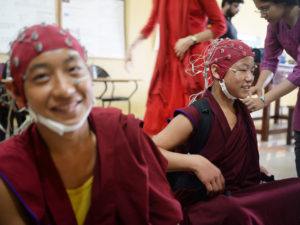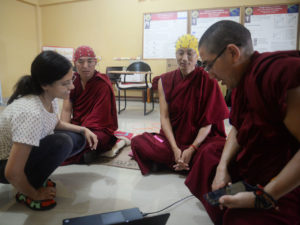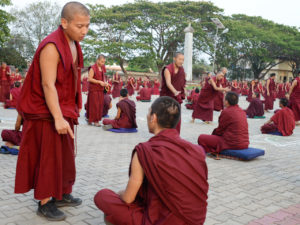Although mindfulness is the most familiar form of meditation practice, especially in the West, it represents a small fraction of the meditation practices that derive from Buddhism. At many Buddhist monasteries and nunneries, the primary form of meditative practice is known as debate, a form of analytical meditation involving two or more monastics who undertake a debate on a topic within canonical Buddhist philosophy.

Publications:
Mindfulness (2020)
“Inter-brain Synchronization in the Practice of Tibetan Monastic Debate.”
Progress in Brain Research (2019)
“Tibetan Buddhist Monastic Debate: Psychological and Neuroscientific Analysis of a Reasoning-Based Analytical Meditation Practice.”
Recent Research Visits:
 Monastic Debate Study at Sera Jey Expands to Sera Mey – Visit #7
Monastic Debate Study at Sera Jey Expands to Sera Mey – Visit #7
(August 7 to 21, 2019)
During this research visit, the team of monastic investigators expanded to include monks from Sera Mey Monastery. The team collected EEG data for approximately 70 new debates. Half of these debates were on a topic considered easy, and the other half were on a difficult topic. To help address the question of how debate is different from meditation, we asked the monks to perform a single-pointed meditation (focused attention meditation) on the statue of Buddha for five minutes before the debate, and an analytical meditation reflecting on the debate at the end. A new rating system for the EEG study was also field tested. For example, the new rating system includes prompts for the standard debate answers such as “yes”, “why”, and “no pervasion,” and includes ratings for emotions such as aggression and laughter. We also began to look at the effects of debate on youth, and tested 6 pairs of teenage monks from the Sera Jey secondary school who follow a modern education but also learn to debate (4 times a week for 1 hour).
More On Debate
 Debate at Sera Jey Monastic University:
Debate at Sera Jey Monastic University:
In its simplest form, debate consists of an interaction between a sitting defender, who is held to consistency of their assertions, and the standing challenger, who challenges the statements of the defender. Debate serves as a core pedagogical technique that supports the development of intellect as well as affords guidance along their inner spiritual path. Successful debating requires skills that may include reasoning and critical thinking, attentional focus, working memory, emotion regulation, and ability to simulate the thinking of the other debater. It is therefore likely that the many cumulative thousands of hours of debate practice over 20-plus years of monastic training helps to cultivate the intellectual nimbleness to look at topics from many different angles.
To date, the burgeoning literature on contemplative practices is almost exclusively restricted to the study of concentrative and awareness meditation practices (e.g., mindfulness). Comparatively less scientific research has been conducted to determine whether and how monastic debate contributes to the intellectual, cognitive, social and emotional functioning of monastics and what core cognitive and affective processes are engaged and developed through the practice.
Possible Impact
Neural and behavioral changes in cognitive function
Monastic debate likely helps to train cognitive functions such as memory, attention, and reasoning. Indeed, in our first studies, we observed debate-related increases in frontal theta oscillations-neural correlates of focus. This increase was stronger for experienced monks. We also found evidence for improvements in logical reasoning. While promising, these findings need to be backed up by longitudinal studies following a cohort of monastics over time to rule out pre-existing differences between groups.
Neural measures of social cognition-empathy and theory of mind
Monastic debate is a contemplative practice done in groups, suggesting that it may affect social cognition. In our preliminary studies, we found that when two monks were agreeing with one another, their brains were more synchronized with each other than when they were disagreeing. This finding suggests that the practice of debate modulates the ability to simulate the thinking of your opponent. However, many more questions remain to be answered. For example, is the level of inter-brain synchrony affected by the quality of the debate? Does this ability to synchronize transfer to other contexts and make it easier to see matters from another person’s perspective?
Emotional Responses and Experiences
Given their centrality to monastic training in Tibetan Buddhism as a means of cultivating critical reasoning and wisdom, analytical meditation and monastic debate may have beneficial effects on emotion. Successful debating likely requires emotional awareness and strong emotion regulation skills. Monastics we interviewed gave examples of how debate practice helps them have a wider perspective on their thoughts, as well as an increased capacity to observe their thoughts from another person’s perspective. Preliminary data indicate that experienced monks report fewer difficulties with emotion regulation and less negative affect. However, there is a need for objective measures of emotional reactions such as heart rate variability and galvanic skin response.
Secularization of Monastic Debate in Global Education
Some of the major challenges facing education are teaching critical thinking and increasing student motivation. The prospect of enlivening educational material has led secular Tibetan secondary schools to utilize the monastic style and rules of debate as a pedagogical tool, and we have collected preliminary EEG data from school children debating about topics such as mathematics. Although debate is reported to lead to a much deeper understanding of the material than individual study, in a very engaging way, there is currently no data to back this up.
